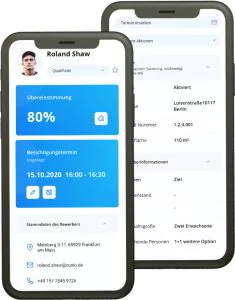Real estate technology startup market has increased by 300% over the last decade, helping to solve the sector’s biggest challenges through technology. Digital transformation in real estate has accelerated with the spread of coronavirus, as businesses were forced to quickly adapt.
The future of real estate technology seems very bright. More than 80% of real estate companies are planning to implement new tech solutions in traditional business processes. It’s not surprising that investment activity doesn’t show any signs of slowing down, reaching $9.7B in the first half of the last year.
Building a successful real estate tech company is all about timing and using the right tech trends. Over the last six years JatApp has been helping real estate companies to digitize their businesses. In this article, we have leveraged our knowledge and expertise to tell you about the key industry trends in the digital era. Without further ado, let’s begin.
Artificial intelligence (AI) and machine learning (ML) in home buying, selling, and financing
Many real estate firms are now relying on artificial intelligence and machine learning in complex decision-making. AI-powered technology allows them to complete tasks that require cognitive skills, like reasoning and self-correction, way faster compared to human beings. Meanwhile, machine learning helps companies make precise predictions based on data available. Real estate tech sector, or otherwise known as PropTech, is driven by widespread adoption of AI and ML. Today, these technologies are actively used in every aspect of property buying, selling, and financing.
Home buying
According to the National Association of Realtors, 97% of buyers begin their searches for properties online. Real estate marketplaces allow users to skim through thousands of listings to find homes that match their unique needs.
The benefit of a ML tool here is its ability to learn what really matters to home buyers and make recommendations in seconds. For example, the digital real estate platform, Homes.com implements machine learning algorithms to ensure a personalized home search. Here is how it works: home buyers upload images of homes across the street they’ve always liked or their dream houses found on Instagram or Pinterest and get recommendations for home listings with similar specifics and looks.
Personalized home buying experience with Homes.com
With AI, the home buying process has been made more efficient for real estate agents as well. Instead of knocking on the doors of hundreds of homes, agents can use AI to predict which properties are most likely to sell and be able to approach homeowners first. The tool analyzes the data related to the property, like how long the owner has been living in their home, what home prices are in this location, or when the house was previously sold.
Compass is a case in point which proves that AI can increase brokers’ chances of winning a home listing by up to 94%. The company’s tool allows agents to accurately determine the home price and thus target home sellers more effectively.
Predicted probability of a home sale by AI Compass
Home selling
In the past, professional home appraisers were assigned to determine the worth of properties for sale. Today, AI can remotely assess the real estate value based on home images, incorporating a neural network that identifies various property characteristics that impact the price.
To give you an idea, let’s take HouseCanary, a famous home selling portal, as an example. AI is used to provide sellers with a comprehensive 20-page home evaluation report, which explains the reasons behind the established price. What’s more, instead of paying up to $900 for traditional home appraisals, sellers can use the HouseCanary service for $59 only. With AI technology, the company is challenging traditional evaluation approaches in terms of both speed and price competitiveness.
HouseCanary home valuation report
Home financing
Advances in AI technology have made it possible to optimize the mortgage process, from determining the most suitable loan type to searching for investors. Now, it takes seconds to show borrowers the amount of money they’re losing each month and each year.
LoanSnap, a mortgage lender, employs AI to process the borrower’s financial data, find best loan options from thousands of alternatives, and come up with the most effective ways for them to pay off the debt. AI helps borrowers to make complex mortgage-related decisions, helping them to save money in the future.
LoanSnap AI-powered loan matching
Virtual home tours
During the global pandemic, on-location visits have fallen in demand, with 90% of sellers willing to limit visits to their houses. With virtual reality, typical buyers no longer need a house tour after contacting every property seller. Virtual home tours allow clients to see the house they love from the comfort of their couch. The technology offers buyers an immersive visualization as if they are physically present at the property. Buyers can virtually take a look at different rooms, spin around, look at the floor and ceiling, or see different floors. Users can even virtually visit a property that is currently under construction as if it was already finished.
Matterport, one of the leaders in the virtual tours market, relies on deep learning algorithms and proprietary machine vision technologies to provide users with the immersive 3D experience. Buyers report to become engaged by 300% more with the company’s virtual tours than 2D home images. 74% of Matterport brokers state that virtual tours helped them to win more home listings.
Matterport virtual home tour
Smart buildings
Smart buildings, or also known as intelligent buildings, utilize the Internet of Things (IoT) devices to collect the information on different aspects related to the buildings so that it can be processed and used to make building operations more efficient and environmentally friendly. Apart from that, the technology can help to improve conditions for building occupants, ensuring their productivity, safety, and comfort.
One of JatApp’s clients, a French startup, helps workplaces and educational institutions to incorporate building intelligence through its IoT power bank sharing stations. The solution enables employees to rent charging bases and portable power banks, so they can work without being attached to their office desks. JatApp assisted the client in building software that connects power banks and the base. Our company also developed iOS and Android mobile applications for users to manage their power banks.
IoT-enabled power bank rental platform
Automation across property management
There are many repetitive tasks in property management that can be readily automated. Today, landlords can use auto-tenant screening to get notified once applications, credit and criminal reports are submitted. What’s more, technology allows landlords to collect rent payment online and tenants to receive notifications when it’s time to pay. Similarly, automation software notifies service providers, tenants, and landlords about maintenance requests and upcoming events.
From our personal experience, JatApp created a notification microservice and mobile application for its German client, Cunio, a property management platform. The digital solution allows to manage all aspects of rental real estate, ranging from tenant screening and rent collection to making announcements and responding to maintenance requests. The platform enables house occupants and service providers to receive different notifications on their smartphones and always keep the lines of communication open.
Cunio app functionality
Changing communication preferences
Technologies are changing the way people want to receive and share information. Property businesses are forced to introduce new real estate digital strategies to satisfy the demands for more efficient, quicker, and easier communication. Let’s discuss what communication preferences are common nowadays and how real estate technology companies are responding to them.
24/7 communication
These days, clients want replies to their questions any time convenient for them. Chatbots offer customers assistance day and night, but introduce a human advisor in case the issue needs a personal touch. In fact, chatbots can effectively handle 80% of frequently asked questions.
Real estate technology investment platforms like Crowdstreet actively use chatbots to help investors understand their investment opportunities and make more informed decisions. The real estate portal cuts service costs and saves time by letting a virtual assistant address concerns that don’t change from investor to investor.
Example of a real estate chatbot
Immediate responses
Offering an immediate response to a customer is the key to starting a successful business-client relationship. Zillow trends report suggests that agent’s responsiveness is critical to 80% of customers. Many real estate businesses are investing in customer relationship management (CRM) that allows agents to manage and track conversations with clients, thereby improving their response speed.
Zillow, a real estate marketplace, created a CRM system with auto-response functionality for brokers to be able to immediately respond during their busiest time period. To ensure a more personal approach, agents can customize their messages to each customer or group of customers. The system also notifies brokers about incoming leads so that they can get back to them at the earliest time possible.
Push notification feature in the Zillow CRM system
Texting
As Forbes suggests, millennials, today’s largest workplace segment, most often prefer text over voice calls. Nearly 90% of smartphone users read their incoming text messages within seconds. Moreover, texting usually takes less time compared to phone calls, and people can interact asynchronously, meaning they can wait for a response and do something else in the meantime.
Text messaging is used for different purposes in property management, like replying to questions about properties, sending appointment reminders, addressing maintenance requests, improving workplace safety, and such. JatApp has recently helped a facility management services company to build a mobile app with the texting features that allows users to report workplace near misses. Near miss is any unplanned situation that can potentially result in environmental damage, injury, or interrupted workflow. To get team members in the habit of safety reporting, our developers included community-building features that users love and actively use on social media, like chats and text comments.
Near miss reporting app functionality
Have a project for us?
The current pandemic forces digitalization upon all sectors, even the most conservative ones such as real estate. Tech solutions like virtual home tours, home value estimators, customized home matching, chatbots, automated property management, and CRM systems are pushing the boundaries of real estate changing the way properties are managed, sold, and purchased. Similar digital real estate trends are emerging in the commercial sector, where owners can capitalize on building intelligence, use mobile apps to address facility needs, and so much more.
Whether you need custom software for property financing, home buying and selling, or facility management, JatApp can help your real estate business stay relevant in the digital world. Our company has completed more than 200 software projects cutting clients’ costs by 60% compared to markets in Western Europe and America. Having access to the largest pool of Eastern European tech talents, we can assist you in developing a high-quality web or mobile application, moving your business to the cloud, as well as maintaining your software.












